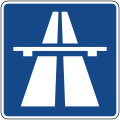| Route |
  |
|
 |
|
Fährhafen Puttgarden (planned) |
 |
|
Burg auf Fehmarn (planned) |
 |
|
Avendorf (planned) |
 |
|
Avendorf (planned)  |
 |
|
Fehmarnsundbrücke 963 m (planned) |
 |
|
Filling station Großenbrode (planned) |
 |
|
Großenbrode (planned)  |
 |
|
Großenbrode (planned) |
|
 |
(5) |
Heiligenhafen-Ost |
.png) |
|
Rest area Ostseeblick |
 |
(-) |
provisorische Anschlussstelle   |
 |
(6) |
Heiligenhafen-Mitte |
 |
(7) |
  Gremersdorf (Nordteil) Gremersdorf (Nordteil) |
 | |
Tunnel Gremersdorf |
 |
(7a) |
  Gremersdorf (Südteil) Gremersdorf (Südteil) |
 |
(8) |
Jahnshof |
 |
(9) |
Oldenburg in Holstein - Nord |
 |
(10) |
Oldenburg in Holstein - Mitte |
 |
(11) |
Oldenburg in Holstein - Süd  |
.png) |
|
Rest area Damlos |
 |
(12) |
Lensahn |
 |
(13) |
Neustadt in Holstein-Pelzerhaken  |
|
|
früher Neustadt i. H. - Nord |
.png) |
|
Rest area Hasselburger Mühle |
 | |
Binnenwasserbrücke 50 m |
 |
(14) |
Neustadt in Holstein - Mitte |
|
|
früher Neustadt i. H. - Süd |
 |
 |
Services Neustädter Bucht |
 |
(15) |
Eutin  |
 |
(16) |
Scharbeutz   |
 |
(17) |
Pansdorf |
 |
(18) |
Ratekau |
.png) |
|
Rest area Sereetzerfeld |
 |
(19) |
Sereetz |
 |
(20) |
  3-way interchange Bad Schwartau 3-way interchange Bad Schwartau  |
 |
(21) |
Bad Schwartau |
 |
(22) |
Lübeck-Zentrum  |
 |
(23) |
Lübeck-Moisling |
 |
(24) |
Lübeck 4-way interchange   |
 |
(25) |
Reinfeld |
 | |
Raststätte Trave  |
.png) |
|
Rest area Melmshöhe  |
 | |
Travebrücke 889 m |
 |
(26) |
Bad Oldesloe  |
 |
(27) |
Bargteheide 4-way interchange   |
 |
 |
Services Buddikate |
 |
(28) |
Ahrensburg / Großhansdorf |
.png) |
|
Rest area Ellerbrook/Ohlendiek |
 |
(29) |
Stapelfeld |
 |
(30) |
Barsbüttel |
 |
(31) |
Hamburg-Ost 4-way interchange   |
 |
(32) |
Hamburg-Öjendorf |
 |
(33) |
Hamburg-Billstedt  |
 | |
Tunnel Billwerder-Moorfleet |
 |
(34) |
Hamburg-Moorfleet  |
 |
(35) |
Hamburg-Südost 4-way interchange  |
 | |
Norderelbbrücke 411 m |
 |
(36) |
Hamburg-Süd 4-way interchange  , ,  |
 |
 |
Services HH-Stillhorn |
 |
(37) |
Hamburg-Stillhorn |
 | |
Süderelbbrücke 471 m |
 |
(38) |
Hamburg-Harburg |
 |
(39) |
Maschener Kreuz  , ,  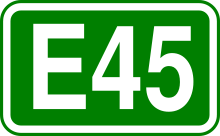 |
 |
(40) |
Horster Dreieck   |
 |
(41) |
Seevetal-Hittfeld |
.png) |
|
Rest area Sunderblick/Hittfeld-Süd |
 |
(42) |
Buchholz-Dibbersen  |
 |
(43) |
Buchholzer Dreieck  |
 |
(44) |
Rade |
 |
 |
Services Hollenstedt/Aarbachkate |
 |
(45) |
Hollenstedt |
 |
|
Stellheide parking area |
 |
(46) |
Heidenau |
 |
|
Freetz/Heidenau parking area |
 |
 |
Services Ostetal |
 |
(47) |
Sittensen  |
.png) |
|
Rest area |
 |
|
Elsdorf (planned) |
.png) |
|
Rest area Bockel/Mulmshorn |
 |
(49) |
Bockel   |
 |
|
Reeßum/Glüversborstel parking area |
 |
(50) |
Stuckenborstel  |
 |
 |
Services Grundbergsee |
 | |
Wümmebrücke 321 m |
 |
(51) |
Posthausen |
 |
|
parking area |
 |
(52) |
Oyten |
.png) |
|
Rest area Oyten |
|
|
Raststätte Oyten fällt weg |
 |
(53) |
Bremer Kreuz   |
 |
(54) |
Uphusen/Bremen-Mahndorf |
.png) |
|
Rest area Marmdorfer Marsch  |
 |
(55) |
Bremen-Hemelingen   |
 | |
Weserbrücke 540 m |
 |
(56) |
Bremen-Arsten  |
 |
|
3-way interchange Bremen-Arsten (planned)  |
.png) |
|
Rest area Alken/Krumhörens Kuhlen |
 |
(57) |
Bremen/Brinkum  |
 |
(58a) |
Stuhr 3-way interchange    |
 |
(58b) |
Delmenhorst-Ost |
|
|
nur Abfahrt Ri. Bremen  |
.png) |
|
Rest area |
 |
(59) |
Groß Ippener |
 |
|
Oldenburg/Groß Ippener parking area |
 |
|
Prinzhöfte parking area  |
 |
|
parking area |
 |
(60) |
Wildeshausen-Nord  |
 |
 |
Services Wildeshausen |
 | |
Huntebrücke 252 m |
 |
|
?/Wildeshausen parking area |
 |
(61) |
Wildeshausen-West  |
.png) |
|
Rest area Ahlhorn Varnhorn |
 |
(62) |
Ahlhorner Heide  |
 |
(62) |
Dreieck Ahlhorner Heide  |
 |
|
Gartfeld/Darntumer Mühle parking area |
 |
(63) |
Cloppenburg    |
.png) |
|
Rest area |
 |
(64) |
Vechta  |
 |
 |
Services Hausstette/Vossberg |
 |
(65) |
Lohne / Dinklage |
|
 |
|
Dinklage/Brockdorf parking area |
 |
|
Dinklage/Holdorf parking area |
 |
(66) |
Holdorf   |
 |
|
Fladderlohausen/Holdorf parking area |
 | |
Raststätte Raststätte Dammer Berge |
 |
|
Autobahnkirche Dammer Berge |
 |
|
Neuenkirchen/Clemens-August-Klinik parking area |
 |
(67) |
Neuenkirchen-Vörden  |
 |
|
Rieste/Vörden parking area |
.png) |
|
Rest area |
 | |
Mittellandkanalbrücke 918 m |
 |
(68) |
Bramsche  |
 |
|
3-way interchange Wallenhorst (planned)  |
 |
|
parking area |
 |
(70) |
Osnabrück-Nord  |
 |
|
Wersen/Büren parking area |
 |
(71) |
Osnabrück-Hafen  |
 | |
Dütetalbrücke |
 |
(72) |
Kreuz Lotte/Osnabrück   |
 |
|
Habichtswald/Petersberg parking area |
 |
 |
Services Tecklenburger Land |
 | |
Talbrücke Habichtswald |
 | |
Talbrücke Smanforde |
 | |
Talbrücke Exterheide |
 |
|
Exterheise/Bashake parking area |
 |
(73) |
Lengerich |
 |
|
Wechte/Sonnenhügel parking area |
 |
(74) |
Ladbergen   |
 |
|
Aabach/Mühlenbach parking area |
 | |
Dortmund-Ems-Kanal-Brücke 582 m |
 |
(75) |
Flughafen Münster/Osnabrück |
.png) |
|
Rest area Maestruper Brook/? |
 |
(76) |
Greven  |
 | |
Emsbrücke 240 m |
 |
|
Gimbter Heide/Klaterberg parking area |
.png) |
|
Rest area Sandrup  Plugger Heide Plugger Heide  |
 |
(77) |
Münster-Nord  |
 |
|
Toppheide (außer Funktion) parking area  |
 |
 |
Services Münsterland |
 |
|
Autobahnkirche Roxel |
 |
(78) |
Kreuz Münster-Süd   |
 |
|
Kibitzhain/Erlenbruch parking area |
 | |
Dortmund-Ems-Kanal-Brücke 214 m |
 |
|
Münster-Hiltrup (planned) |
 |
|
Davert/Weißes Venn parking area |
 |
|
Kurze Geist/Hohe Heide parking area |
 |
(79) |
Ascheberg  |
 |
 |
Services KleinRaststätte Eichengrund  Im Mersch Im Mersch  |
 |
|
Westerwinkel/Hasenkämpe parking area |
 |
(80) |
Hamm-Bockum / Werne  |
.png) |
|
Rest area Fuchs-Eggen/An der Landwehr |
 | |
Lippebrücke 445 m |
 | |
Datteln-Hamm-Kanal-Brücke 318 m |
 |
(81) |
Hamm / Bergkamen |
 |
|
Overberger Busch/Haus Reck parking area |
 |
(82) |
Kamener Kreuz   |
 |
(83) |
Kamen-Zentrum  |
 |
|
Dortmund-Wickede (planned) |
 |
(84) |
Unna-Zentrum  |
 |
(84a) |
Dortmund / Unna 4-way interchange   |
 | |
Talbrücke 300 m |
 |
 |
Services Lichtendorf |
 | |
Talbrücke Blockheide 200 m |
 |
(85) |
Schwerte  |
 |
(86) |
Westhofener Kreuz   |
|
|

|
6-streifiger Ausbau bis Juli 2008 |
 |
 |
Bahnbrücke 100 m |
 |
 |
Ruhrtalbrücke 196 m |
  |
 |
Rest area Lennhof-Süd  (under construction) (under construction) |
  |
 |
Rest area Lennhof-Nord  (under construction) (under construction) |
 |
 |
Lennebrücke 227 m |
 |
 |
Bahnbrücke 150 m |
|
 |
(87) |
Hagen-Nord |
 | |
Bahnbrücke 100 m |
 | |
Volmebrücke 484 m |
 | |
Tunnel Vorhalle 121 m |
 |
(88) |
Hagen-West  |
.png) |
|
Rest area Eichenkamp/Funckenhausen |
 | |
Talbrücke Volmarstein 320 m |
 |
(89) |
Volmarstein |
 |
(90) |
Gevelsberg |
.png) |
|
Rest area Bruchmühle/Klosterholz |
 |
(92) |
Kreuz Wuppertal-Nord  , ,   |
 |
(93) |
Wuppertal-Langerfeld 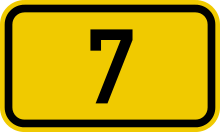 |
|
|

|
6-streifiger Ausbau bis Dezember 2008 |
 |
 |
Schwelmetalbrücke 220 m |
 |
 |
Talbrücke Langerfeld 325 m |
  |
 |
Rest area Ehrenberg + Kucksiepen (under construction) |
 |
 |
Wuppertalbrücke Öhde 418 m |
|
 |
(94) |
Wuppertal-Ronsdorf |
 |
(95a) |
Remscheid - Lennep |
 | |
Talbrücke Diepmannsbach 296 m |
 |
(95b) |
Remscheid-Zentrum  |
|
|

|
6-streifiger Ausbau bis Dezember 2010 |
 |
 |
Eschbachtalbrücke 50 m |
  |
 |
Rest area Remscheid (under construction) |
 |
 |
Talbrücke Höllenbach 300 m |
 |
 |
Talbrücke Einsiedelstein 200 m |
|
 |
(96) |
Wermelskirchen |
 | |
Talbrücke Brucher Mühle 100 m |
 |
(97) |
Burscheid   |
 | |
Talbrücke Lambertsmühle 150 m |
 | |
Köttersbachtalbrücke 150 m |
|
|
 Beginn Kölner Ring Beginn Kölner Ring |
 |
(98) |
Leverkusen 4-way interchange   |
 | |
Hochstraße 928 m |
 |
(99) |
Leverkusen-West 4-way interchange  |
 | |
Hochstraße 527 m |
 | |
Leverkusener Brücke Rheinbrücke, 1.061 m |
 |
(100) |
Köln-Niehl |
 |
(101) |
Köln-Nord 4-way interchange   |
 |
(102) |
Köln-Bocklemünd  |
 | |
Tunnel Einhausung Lövenich 1550m |
 |
(103) |
Köln-Lövenich  |
|
 |
(104) |
Autobahnkreuz Köln-West  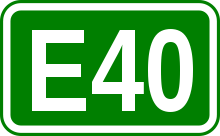 |
|
|
 Ende Kölner Ring Ende Kölner Ring |
 |
(104) |
Frechen   |
 |
(105) |
Hürth |
 |
 |
Services Ville |
 |
(106) |
Knapsack |
 | |
Erftbrücke 50 m |
 |
(107) |
Erfttal 3-way interchange   |
 |
(108) |
Erftstadt  |
 |
(109) |
Kreuz Bliesheim  , ,  |
 |
|
Oberste Heide parking area |
 |
(110) |
Euskirchen(Nordteil)  |
 |
(110) |
Euskirchen(Südteil)  |
 |
(111) |
Wisskirchen  |
.png) |
|
Rest area |
|
|
Die P-WC-Anlage wird durch die Raststätte ersetzt |
 |
 |
Rest area Grüner Winkel (planned) |
 | |
Krebsbachtalbrücke 471 m |
 |
(112) |
Bad Münstereifel / Mechernich |
 |
(113) |
Nettersheim |
 | |
Quartbachtalbrücke800 m |
.png) |
|
Rest area Engelgau |
 |
(114) |
Blankenheim / Tondorf   |
 |
(-) |
provisorischer Anschluss |
|
| unterbrochen, vordringlicher Bedarf |
 |
|
Lommersdorf (planned) |
 |
|
Aulbachtalbrücke 920 m (planned) |
 |
|
Ahrtalbrücke 840 m (planned) |
 |
|
Adenau (planned) |
 |
|
Talbrücke Nohner Bach Nord (planned) |
 |
|
Talbrücke 100 m (planned) |
 |
|
Talbrücke Hollerseifen (planned) |
 |
|
Talbrücke Nohner Bach Süd (planned) |
 |
|
Talbrücke Heyroth (planned) |
 |
|
Talbrücke Haiental (planned) |
 |
|
Talbrücke Bongard (planned) |
 |
|
Talbrücke Grünbach (planned) |
|
 |
(117) |
Kelberg |
 | |
Talbrücke Königsuhr 121 m |
 |
(118) |
Gerolstein |
 | |
Talbrücke Jeichensuhr |
 | |
Liesertalbrücke 578 m |
 | |
Maubachtalbrücke 234 m |
 | |
Talbrücke Hörscheid 167 m |
 |
(119) |
Daun  |
 |
(120) |
Vulkaneifel 3-way interchange   |
 |
(121) |
Mehren  |
.png) |
|
Rest area Schalkenmehren/Udler |
 |
(122) |
Manderscheid |
 |
 |
Services Eifel |
 |
(123) |
Hasborn |
.png) |
|
Rest area Lüxem  |
 |
|
parking area  |
 |
(125) |
Wittlich-Mitte  |
 | |
Liesertalbrücke 320 m |
 |
(126) |
Wittlich 4-way interchange   |
 | |
Grünbrücke |
 |
|
Salmrohr/Pohlbach parking area |
 |
(127) |
Salmtal |
 | |
Salmtalbrücke 75 m |
.png) |
|
Rest area Hetzerath/Rivenich |
 |
(128) |
Föhren |
 |
(129) |
Schweich |
 | |
Mosel |
 | |
Moseltalbrücke 987 m |
 |
(130) |
Moseltal 3-way interchange    |
 | |
Fellerbachtalbrücke 829 m |
|
 |
Porta Nigra |
 | |
Molesbachtalbrücke 300 m |
.png) |
|
Rest area Mehringer Höhe |
|
 |
Villa Rustika Mehring |
 |
(131) |
Mehring |
|
 |
Naturpark Saar-Hunsrück |
 |
 |
Services Hochwald |
 |
(132) |
Reinsfeld  |
 |
(133) |
Hermeskeil |
 |
|
Katzenberg/Steinerwald parking area |
|
 |
Naturpark Saar-Hunsrück |
 | |
Lösterbachtalbrücke 644 m |
 |
(134) |
Nonnweiler-Bierfeld |
|
 |
Celtic circular wall of Otzenhausen |
 | |
Primstalbrücke 686 m |
 |
(135) |
Nonnweiler 3-way interchange  |
 |
(136) |
Nonnweiler-Otzenhausen |
 | |
Münzbachtalbrücke 200 m |
 |
(137) |
Nonnweiler-Braunshausen |
 |
|
Kastel parking area  |
 |
|
Peterberg parking area  |
 | |
Talbrücke Mettnich 300 m |
 |
(138) |
Nonnweiler-Primstal |
 |
|
Sombach-Mühle parking area |
 |
(139) |
Tholey-Hasborn |
 |
|
Schaumberg-Kreuz parking area |
 |
(140) |
Tholey  |
 |
|
Schellenbach parking area |
 | |
Klingelfloßtalbrücke 350 m |
 |
(141) |
Eppelborn  |
 | |
Illtalbrücke 125 m |
 |
(142) |
Illingen |
 |
(143) |
Saarbrücken 4-way interchange  |
 |
(144) |
Quierschied |
 |
(145) |
Holz |
 |
|
Neuhaus parking area |
 |
(146) |
Riegelsberg |
 |
(147) |
Saarbrücken-Neuhaus  |
 |
(148) |
Saarbrücken-Von der Heydt |
 |
(150) |
Saarbrücken-Burbach  |
 |
(230) |
Saarbrucken-Burbach  |
 |
(255) |
Saarbrucken-Burbach B1000 |
 |
(257) |
Saarbrucken-Burbach B10000 |
 |
(276) |
Saarbrucken-Burbach B11200 |
 |
(299) |
Saarbrucken-Barbach B11300 |
 |
(308) |
Saarbrucken-Barbach B11600 |
 |
(313) |
Saarbrucken-Barbach B11700 |
 |
(332) |
Saarbrucken-Barbach B11800 |
 |
(349) |
Saarbrucken-Barbach B11900 |
| |
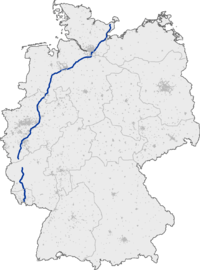
 Geographic data related to Bundesautobahn 1 at OpenStreetMap
Geographic data related to Bundesautobahn 1 at OpenStreetMap
